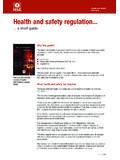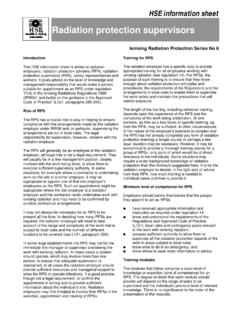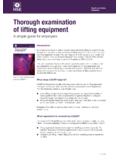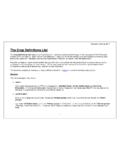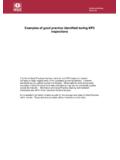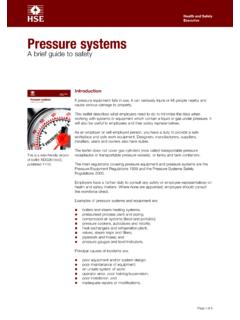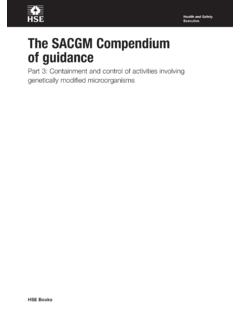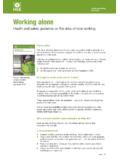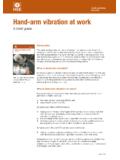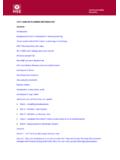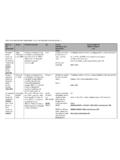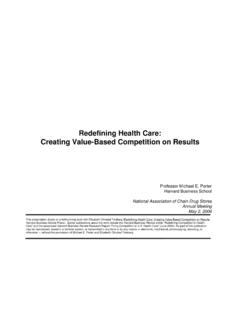Transcription of RESEARCH REPORT 305 - Health and Safety Executive
1 HSE. Health & Safety Executive Health and well-being in the offshore environment: The management of personal Health Prepared by University of Aberdeen for the Health and Safety Executive 2005. RESEARCH REPORT 305. HSE. Health & Safety Executive Health and well-being in the offshore environment: The management of personal Health Kathryn Mearns and Lorraine Hope Industrial Psychology RESEARCH Centre University of Aberdeen Kings College Aberdeen AB24 2UB. The current study was conducted to examine Health behaviours and Health management practices on offshore installations on the UKCS.
2 The RESEARCH was fully sponsored by Offshore Safety Division of the UK Health and Safety Executive and constitutes the first phase of a project to examine the relationships between the management of both Safety and Health in the offshore environment and the potential outcomes for an employer of investing in workforce Health . This REPORT and the work it describes were funded by the Health and Safety Executive (HSE). Its contents, including any opinions and/or conclusions expressed, are those of the authors alone and do not necessarily reflect HSE policy.
3 HSE BOOKS. Crown copyright 2005. First published 2005. ISBN 0 7176 2993 7. All rights reserved. No part of this publication may be reproduced, stored in a retrieval system, or transmitted in any form or by any means (electronic, mechanical, photocopying, recording or otherwise) without the prior written permission of the copyright owner. Applications for reproduction should be made in writing to: Licensing Division, Her Majesty's Stationery Office, St Clements House, 2-16 Colegate, Norwich NR3 1BQ. or by e-mail to ii Executive SUMMARY. Introduction The current study was conducted to examine Health behaviours and Health management practices on offshore installations on the UKCS.
4 The RESEARCH was fully sponsored by Offshore Safety Division of the UK Health and Safety Executive and constitutes the first phase of a project to examine the relationships between the management of both Safety and Health in the offshore environment and the potential outcomes for an employer of investing in workforce Health . Previous findings indicated that the positive management of Health promotion and Health surveillance activities offshore was associated with lower lost time injury rates (Mearns et al., 2000). The current RESEARCH project aimed to examine Health promotion and Health surveillance activities in greater detail and specifically, address the following RESEARCH questions concerned with the potential relationships between Health management and the overall Safety and well- being of the offshore worker.
5 RESEARCH Question I: Do healthy employees cope better in the offshore environment? This RESEARCH question sought to address the extent to which good Health habits foster the ability to cope with working and living offshore. In other words, examine whether engaging in personal Health and fitness management is associated with a perceived increase in ability to cope both physically and psychologically with the offshore working environment? RESEARCH Question II: Does investment in employee Health foster perceptions of company commitment and build worker loyalty in areas such as Safety ?
6 Is increased investment in Health promotion and surveillance perceived to be indicative of higher levels of management commitment to the workforce and, if so, what is the effect of this additional investment? RESEARCH Question III: Are positive Health management practices also associated with good risk assessments? It may simply be the case that an installation proficient in the management of occupational Health issues will also be good at accident risk assessment. Until recently, RESEARCH focussing on Safety performance and behaviour within organisations has typically attempted to identify the individual level factors underpinning accidents and injuries in the workplace.
7 However, emphasis on these individual level factors has shifted towards a focus on the impact of various organizational factors. The current RESEARCH focuses on the impact of positive management of workforce Health as an organizational factor. Since Safety has traditionally taken precedence over Health affairs, it is likely that many organisations have now reached a developmental stage where the Health of their workforce is becoming increasingly important and they perceive the need to re-dress the balance for a Health ' and Safety ' culture in equilibrium.
8 Iii Sample and Method This study was carried out in three stages. The initial phase involved the development of the Health at Work questionnaire ; the second phase involved the piloting and revision of the questionnaire while questionnaire deployment to all participating installations comprised the final phase. The Health at Work 2003 questionnaire underwent extensive development and the final questionnaire comprised seven sections designed to elicit the following information: Perceived impact of factors present in the offshore environment on worker Health Experience of and satisfaction with the management of occupational Health risks Personal Health management and goals Perceived colleague and organizational support Health promotion activities in the workplace Perception of Health and Safety climate Risk taking behaviour Worksite commitment Throughout the questionnaire .
9 Respondents were also invited to record more detailed comments on specific issues relating to their experiences and the management of Health and Safety offshore. Medical personnel on participating installations were also required to complete a comprehensive questionnaire . The main purpose of this questionnaire was to assess the role of the medic in relation to Health promotion and training available in the workplace. This questionnaire also allowed the collection of other relevant information relating to the role and background of the medic in addition to their perceptions of their role.
10 Finally, this questionnaire also allowed for the collation of other data relating to illness and injuries, Health surveillance and participation in Health award schemes. A total of 2,199 completed questionnaires were collected from 41 UK offshore installations operating on the UK Continental Shelf. Installations with a response rate lower than 30% were excluded from further analysis. Consequently, 1,928 completed questionnaires from 31. installations (nine different organisations) were available for analysis. Statistical methods included analysis of variance (ANOVA) with post-hoc testing to distinguish between installations, chi-square and correlational analyses to determine associations between selected variables Results The REPORT describes the initial pattern of results for all participating installations on all questionnaire items, constituting a significant data bank for future reference purposes.
